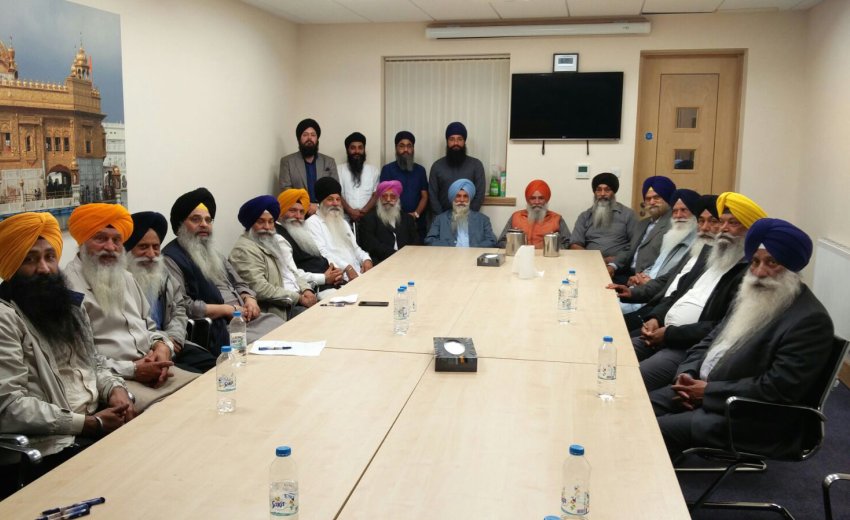Sri Akal Takht Sahib epitomises the Guru Jote-Jugat[1] concept as the Khalsa Panth assembled before Sri Guru Granth Sahib for managing Sikh religio-temporal affairs. The Jote-Jugat Guru concept is inherent in such a Guru-Sangat assembly.
The question asked sometimes, “How can the whole Khalsa Panth assemble in “one place?” misses the ideological aspect of Sri Akal Takht Sahib which refers to both, a geographical location as well as the Khalsa collective not confined to any one place. Like drops of water, a few represent the many. Their consistency and flow is the same. Gurmat based processes can provide the modus operandi, consistency and continuity from local Sangats to a world assembly dedicated (samarpit) to Sri Akal Takht Sahib.
Jathedar Akal Takht Sahib and the other Singh Sahiban of the Takhts have a crucial role in making the collective processes work so that this miri-piri (temporal-spiritual) institution is acknowledged and respected as the voice of the Guru Khalsa Panth. Outside influence is eliminated when Gurmat tradition is followed. Jathedar Akal Takht Sahib and the Singh Sahiban meditate on the Guru’s Word to make decisions on matters referred to them together with the necessary information and briefings (vicharpattar).
How Sikh issues and matters which affect the world Sikh community are referred to Sri Akal Takht Sahib, is an area which needs further thought. However, the role of a true Sikh leader needs clarity in accordance with Sikhi tradition. A Sikh leader is a facilitator. He or she does not say, “let us unite… but behind me!” That is not leadership in Sikhi but ego-centric haomai which creates distrust and divisions. Leading Sikh role models in history were team workers who brought about unity through own example as community sevadars. They were facilitators for arriving at collective decisions from local to the Sarbat Khalsa levels. Jathedar Akal Takht Sahib’s role should be the same today. He does not issue hukamnamas (edicts) as he pleases or, sometimes, even while on the move!
World level co-operation and consultation is necessary in many diverse fields. The recent launch of the World Sikh Parliament in the UK can be seen as mainly a political initiative, the details of which are still emerging. Some would argue that the Sikh Parliament is a political necessity because the Sikhs have always regarded themselves as a distinct people, a qaom or a nation. A close study of the Mughal and the Anglo-Sikh periods confirms that to be true, right up to the Indian independence movement and the tripartite independence talks in which Sikh leadership chose to side with India.
Many current Sikh issues are political and can only be tackled by coming to terms with that reality. More so as India’s secularism continues to shift openly towards Hindutva objectives. The World Sikh Parliament development will continue to be watched with interest by the Sikh diaspora.
However, if the middle and longer term intention is to have one umbrella global body to cover diverse topics, then the scope needs to be widened to include expert representation. World level co-operation and consultation is needed in religious, social, educational, heritage, economic and political fields. The Sikh view is sought regarding many modern scientific and technological developments and environmental challenges in today’s ever shrinking world. Some sort of international Sikh co-operation and information exchange have been going on behind the scenes for some years, but not in any organised way.
To have more than one world level Sikh body would be divisive and would defeat the main objective. The same goes for a national level round-table forum for Gurdwaras and Sikh organisations. In the UK, the Sikh Council UK was set up to provide that facility for affiliated Gurdwaras and organisations while they retain independence of operation.
The idea of a world level Sikh collective is not new and there have been earlier attempts to set up think tanks and councils. It will become clearer in due course if the World Sikh Parliament set up recently is able to expand its role to different fields by enlisting the support of professional level Sikhs in the diaspora. At the very least the same permanent professional level administration can be shared by expert subject forums.
The impression gained from the present Jathedar Sri Akal Takht Sahib is that a world level initiative which remains samarpit (dedicated) to Sri Akal Takht Sahib would be a step in the right direction. Briefings (vichaar pattar) by scholars and subject experts can be submitted to the Singh Sahiban for Gumat-based decisions. Other issues can be referred for guidance and direction.
Implementation of such processes would ensure informed guidance and edicts from Sri Akal Takht Sahib. Hopefully, the whole process would bring about urgently needed improvements in the secretariats of Sri Akal Takht Sahib and the Shromani Gurdwara Parbandhak Committee.
Thus, with the right processes in place, Sikh religio-temporal affairs can be managed upwards from local Sangats through national to international levels while remaining linked to Sri Akal Takht Sahib.
[1] Guru Light and Method. Sri Guru Granth Sahib, the Word Guru is the Guiding Light and Guru Khalsa Panth collectively decides the method i.e. the practical application of the Guru’s teaching to our daily lives.





